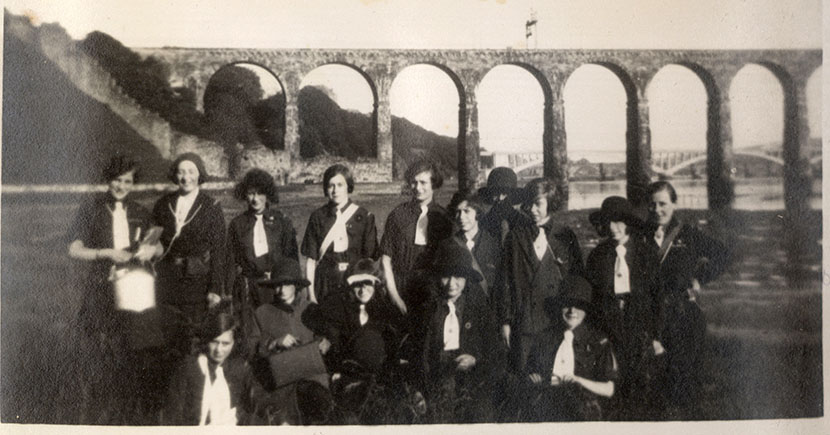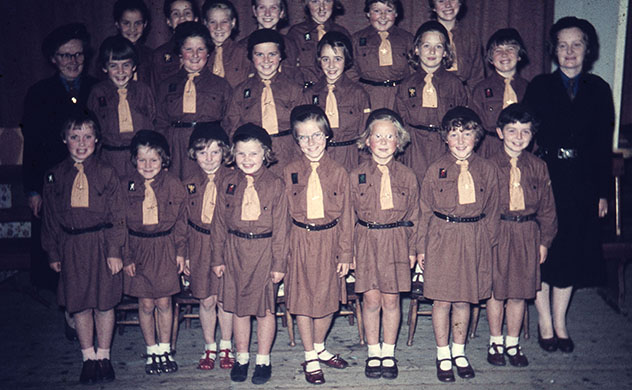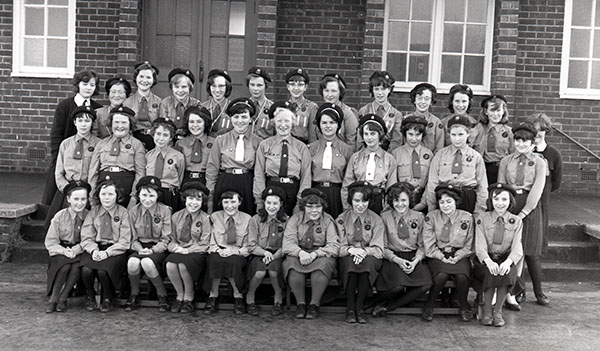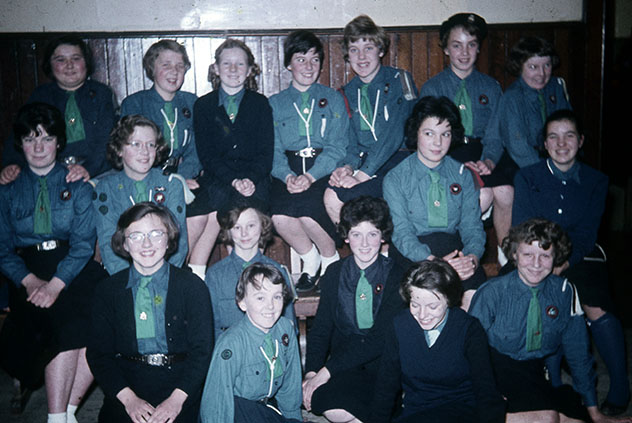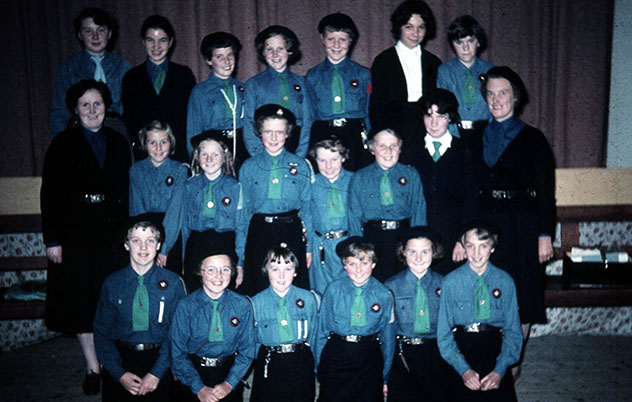THE GIRL GUIDE MOVEMENT IN BERWICK
LOCAL ASSOCIATION FORMED
For some reason or other the Girl Guide movement has never in the past been taken up as keenly in Berwick as the Boy Scout movement. There has been a company of Guides in the town for some years connected with St. Ronan’s School, but it was not until this spring that an effort was made to spread the movement and give the girls of the town the same advantage as have been extended to the boys for some years now. In February, mainly through the influence of the Rev. S. E. R. Fenning, County Scout Commissioner, eight girls in the town set to work to make themselves efficient “Guiders.” They have trained regularly every week, have gone whole-heartedly into the movement, and some time ago were enrolled by Mrs Milne Home, Paxton House, County Commissioner for Berwickshire. They also joined the Berwickshire Girl Guides” Camp at Cockburnspath during the summer, and being now trained, they are ready to take command of companies of Guides. A further step forwards the success of the movement in the town was made on Friday evening, when a meeting was held in the Council Chamber for the purpose of forming a Local Association. The Sheriff presided, and there was a good attendance present. Mrs Milne Home was present to explain the aims and objects of the Girl Guide movement, and the “Guiders” in their smart navy uniforms were also present. Miss Lulu Thompson acting as Secretary and Miss Lettice Darling as Treasurer. The Rev. S. E. R. Fenning was also present and others who showed their interest. The “Guiders” present were:- Misses J. peacock, Tweedmouth; L. Darling, Bondington; C. F. Grey, Moorside; A. Hogarth, Castlegate; H. Webster, Ravensdowne; L. Thompson, Bridge Street; and E. Edminson, Tweed Street. Miss L. Thompson, as Secretary, read a list of apologies from those who had promised to help with the movement. (full list within original newspaper article).
The Sheriff, introducing Mrs Milne Home, told the audience that the day before he had had the pleasure of entertaining the Boy Scout Commissioner from Berwick in Victoria, Australia, who had come across with 240 boys to the Jamboree at Wembley. Coming from Berwick, the naturally wanted to see the old Border town. In the course of conversation, they talked about the international Jamboree which had recently been held at Copenhagen, and Mr Redpath asked his visitor whether he considered it had been worth while. In reply the Commissioner from Berwick had remarked on the good fellowship which had, existed between the Scouts of the various nations, how Germans and French and boys from other nations had fraternised, and Mr Redpath was sure that with such good fellowship between the Scouts there was a better chance of a world peace.
MRS MILNE HOME EXPLAINS THE AIMS
Mrs Milne Home, at the outset of her remarks, said it was very necessary to get the Girl Guide Movement in Berwick on to a good business footing. The Berwick Guides should properly be under the County of Northumberland, but as the county was so big and the organisation so large, it had been considered more advisable to do as the Boy Scouts had done, and work with Scotland. That was the reason why as County Commissioner for Berwickshire she was present to do what she could to help to form an Association. In outlining the aims of the movement, Mrs Milne Home remarked that one of the most unlooked for results of the war was the increased importance of women’s work. They all knew how much women did to help; how they helped the Army, the navy, and the Air Force; how they became gardeners, worked in banks, and helped in many other ways. It seemed to her that in the very difficult years through which the country was passing that there was a more urgent necessity than ever that girls should be trained to do their very best for the country and for themselves. It was with this idea that Baden Powell started the movement, even in the days before the war.
One of the great aims of the Girl Guide movement was to encourage girls to develop in themselves, as girls were rather too inclined to run about in flocks and do what others did. The movement did not in any way aim at taking the place of school training, and they had such good schools in the North that they could not achieve the aims of the Guide movement in a better way than by working in co-operation with the schools. The very fact that the movement had so many members showed how well the system was working. The Girl Guides were a large and happy family of girls of all classes, creeds and politics. They were a very large family, as at the end of last year they numbered 585,000 Guides, in all parts of the world. There were a great many in this country all over the world, and they were of all ages from 7 up to 81. (Laughter). From 7 to 11 the girls were called “Brownies,” and at this age they were so keen that they must take a good deal of looking after. From 11 to 16 they are Girl Guides proper and were always very neat and tidy. After 16 the girls became Rangers, and Mrs Milne Home felt that it would be very useful if the Ranger movement could be started in Berwick, where there must be a good many girls of that age who were at a loose end to know what to do with themselves, girls in service who might be got to take an interest in the Rangers’ meetings, and be kept from the many dangers which beset young girls of that age.
People asked what girls did on becoming Guides. Each Guide, first of all, makes three promises:-
- She promise to do her best to do her duty to God and King, which means that she will do her best to make her own little bit of the world a better and happier place; to work against everything bad and ugly and hateful, and to work for everything which is good, and happy and bright; to try to do her very best to live the life for which God put her into the world. She has to live up to her religion to bring her religion into everything, not only to go to church on Sunday, but to bring her religion into her daily life.
- A Guide promises to help others at all times, and in order to do so has to live up to the Guide motto, “Be Prepared.” Especially must she help her home people first, and there are lots of ways in which she can do this. There is cooking, first aid, child nursing, sick nursing, and a great many other things like that. When a Guide can pass her tests in these things she gets proficiency badges. In addition to all these things and others that a girl in the town is likely to be interested in, there are also things which a girl in the country may be interested in, such as keeping chickens, bee keeping, writing, or even an authoress’s badge. There was not really anything which was likely to be of interest to girls in their lives for which tests could not be passed and badges obtained.
- A Girl Guide had to promise to keep the Guide Laws, which Mrs Milne Home read to the gathering, explaining that they were practically the same as the Boy Scout Laws.
Mrs Milne Home further explained that girls who joined companies of Girl Guides were expected to attend the weekly meetings of the company. These meetings lasted about an hour or an hour and a half, and the Guides played and worked together very happily, never wasting any time, but even in games learning something and always trying to do the very best they could. Mrs Milne Home also explained that Guides were divided into Patrols, a Patrol consisting of from 3 to 16, but usually 3 to 8 girls. The girls in a Patrol usually choose their own leader, and leaders have a lot to do in the management of a company.
In conclusion, Mrs Milne Home, read extracts from a letter written by the Rev. R. W. de la Hey, in which he suggested that some of the existing Church organisations, which had for their object the bringing of young people together in fellowship, and training them to be good citizens, might be affiliated to the Girl Guides. Mrs Milne Home offered to answer questions if anyone wanted further information on the Guide movement.
The Rev. T. P. Allan said that those who hoped to form companies would like to know details as to expenses, class or children, etc. In reply Mrs Milne Home pointed out that there was no class in the Guide movement, this being one of the things which helped to make it such a tremendous success. So far as expenses were concerned these would be very little. The uniforms were paid for by the girls themselves, and in cases where a girl cannot afford to pay for her uniform all at once, she can pay it off by paying a small subscription each week. The belts and ties usually belong to the company, and when a girl leaves the Guides, these go back to the company. To purchase these the Guides need to have a small fund, and as they are not allowed to beg, they may get up some sort of entertainment to raise the funds.
The Rev. S. E. R. Fenning, Commissioner for the Boy Scouts, said he felt it was a very excellent thing to have a sister organisation in the same Borough. One of the great difficulties that the Scouts had had to contend with was the supply of officers. (Hear, hear.) This was a difficulty which had to be met in all voluntary work. He had found this a great difficulty since he took over from Major Tower Robertson, who had done such good work in the past. In regard to the Girl Guide movement, they would be very well situated in the initial stages, as they had so many excellent officers who were ready to go forward and take their part in the movement. There was Miss Thompson and the other ladies who had been working so hard since February and had made themselves efficient to take charge of the companies which were about to be formed. They had been through the mill and understood all that they would have to impart to the young people they would be in charge of in the future. They had attended the Berwickshire Camp at Cockburnspath, and Mr Fenning understood that they were so efficient as to be almost the “star turn.” They were so good at pitching and striking tents that they had been asked to remain after to see to the clearing up of the tents. That spoke well for their efficiency. Mr Fenning stated he was very keen to have a company of Girl Guides in connection with St. Mary’s Church, and he suggested that one of the points the Association might consider, was whether it would be better to have Church companies or open companies, not definitely connected with Churches; whether they should have open troops or closed troops. He thought that this was one of the points that it would be as well to get decided at the outset, so that they could go forward knowing exactly where they stood. Mr Fenning expressed their indebtedness to Mrs Milne Home for her kind presence and the tremendous amount of thought, energy and care that she had expended on launching the Girl Guide movement in Berwick. (Applause).
Mr Allan referring to the question of open or closed companies, said that for Spittal, where they hoped to be able to organise a company it would have to be for the whole of Spittal. Mr Allan said he was struck by the rule of the Girl Guides which enjoined that they must “smile under all circumstances.” This was a very hard rule – (laughter) – and he thought that he himself would have great difficulty to smile under certain circumstances. He also remarked on the rule that a Girl guide was expected to do her duty to God and man. he did not think that there was anything that required to be impressed upon the youth of our time more than duty. Duty and discipline were the great things lacking in the children of our time. If the Girl Guide movement could do anything to bring our young people to a sense of their duty, rather than a rush after pleasure it should do a great deal to help not only churches, but also the hoe life of our girls. It was most important to put duty to God first, as though the Girl Guide movement could not be regarded directly as a religious organisation, yet to have religion as the very centre of things must be a very great help to the movement. He hoped that they would be able to organise a company in Spittal, and that they would have one of the ladies who had trained as Captain. This work would, like every other kind of work of a similar character, depend for its success on the officers. If they got good officers, and a really efficient person at the head of a movement of this kind, it would succeed, but if they got inefficient people it would go down.
Mrs Milne Home intimated that Miss McCreath had agreed to become District Commissioner for Berwick. (Applause.) as such Miss McCreath would act as Chairman of the Local Association. Miss McCreath was shortly going to America on a visit, and had suggested that she ought to withdraw, but Mrs Milne Home did not see any necessity for this, as during her absence, the Vice-Chairman could act. She explained that the objects of a Local Association were to encourage the movement and to help the companies if any funds were wanted. An executive committee would be appointed, but this had no control over Patrol funds. The executive committee would have to appoint a Badge Committee to examine Guides for their proficiency badges. Mrs Milne Home further explained that feeling the Berwick patrols would rather be called 1st, 2nd, 3rd and 4th Berwicks, like the Scouts, and not have anything to do with Berwickshire, she had applied to headquarters in Scotland asking if this would be allowed. She had hoped to have had a reply before the meeting but unfortunately this had not come, but she felt that there would be no difficulty in regard to this. According to rules, however, it would be necessary for the Secretary of the Berwick Association to apply for literature, etc, through the Berwickshire County Secretary.
ASSOCIATION FORMED
On a motion being put to the meeting that a Local Association be formed in Berwick this was unanimously carried. Miss Margery Holmes, bridge Street, agreed to act as Secretary to the Association, temporarily, and Miss M. Gray, Bankhill, was appointed Treasurer, and Miss Ruth Darling, Spittal, as Vice-Chairman. All those present at the meeting, those who had sent apologies, and those who had promised to help, were all elected members of the Association. The following were elected to form an Executive Committee: – Berwick: Miss Caverhill, Ravensdowne; Mrs S. E. R. Fenning, St. Mary’s Vicarage; and Mrs P. M. Henderson, Bankhill, Tweedmouth; Mrs J. Grey, Moorside House, and Miss M. Riddle, Turret Villa. Spittal: Mrs T. P. Allan, The Vicarage, and Miss Chisholm. The election of Vice-Presidents was left to the Executive Committee.
Mr Allan proposed a vote of thanks to Mrs Milne Home and the Sheriff for presiding. The Sheriff had acted up to the Guide law, as he had smiled all through the meeting (Laughter.)
The Sheriff thought that Mrs Milne Home deserved a special vote of thanks. Without her presence at the meeting, they would not have been able to get the information they required.
Mrs Milne Home, in reply, admitted that though she had felt very nervous she had tried to keep the Girl Guide rule and “smile every time.” (Laughter.)


